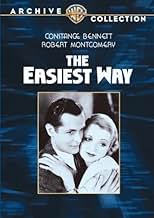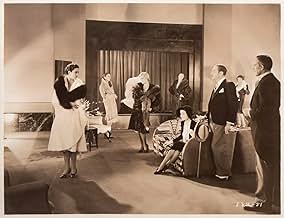Laura from a poor family rejects her boyfriend for a wealthy older man. She falls for a younger journalist, leaves the wealthy man but struggles financially.Laura from a poor family rejects her boyfriend for a wealthy older man. She falls for a younger journalist, leaves the wealthy man but struggles financially.Laura from a poor family rejects her boyfriend for a wealthy older man. She falls for a younger journalist, leaves the wealthy man but struggles financially.
- Director
- Writers
- Stars
- Awards
- 1 win total
- Hotel Clerk
- (uncredited)
- Brockton Associate
- (uncredited)
- Women at Cook-Out
- (uncredited)
- Andy Murdock
- (uncredited)
- Chris Swoboda - Laura's Suitor
- (uncredited)
- Bud Williams
- (uncredited)
- Mrs. Clara Williams
- (uncredited)
- Mr. Gensler
- (uncredited)
- Tillie Murdock
- (uncredited)
- Alfred - Brockton's Butler
- (uncredited)
- Director
- Writers
- All cast & crew
- Production, box office & more at IMDbPro
Featured reviews
The film, directed by Jack Conway, is curiosity piece by today's standards. The original work was made for the stage where there was an open mind about risky situations. We are presented with a poor family at the beginning of the story living in a crowded tenement. Laura, the beautiful young girl has no future of getting a rich man that will take her away from the poverty she is living. When a rich man enters her life, she sees the opportunity to escape her humble origins.
The film deals in a realistic way with the subject of the illicit affair between Laura and Bill Brockton. When she falls for young Jack Madison, she believes that she must abandon the man that provides her comfort and easy life, until she finds herself penniless and must face with the fact that she has to go back to Bill, but loses Jack in the process. At the end, we watch her spying outside her married sister's suburban house which is the epitome of happiness.
Constance Bennett makes an interesting Laura, but this is not her best role in the movies. Robert Montgomery is not seen enough in the film. Adolph Menjou makes a great Bill Brockton, the rich man who loves Laura in spite of the fact he knows Laura doesn't care for him. Clark Gable made a good impression as the brother-in-law critical to Laura. Marjorie Rambeau, Anita Page and Hedda Haper appear in minor roles.
This is a pre-Code film, but it's a mixed bag relative to moralistic messaging, and that was a little frustrating. Its premise is born out of the Depression, and it being tough for working families to make ends meet. In a common theme from the era, a sudden event promises a change in fortune: the meeting of a rich man. It comes at a cost, however, and "the easiest way" out of one's problems is soon shown to be the hard way.
We initially meet a large family in an early morning scene that was sharp and full of life. Kids of all ages sharing beds are being awakened by their mother and sent on errands or called to get their breakfast. The father announces he is tired of the physical strain of working as a longshoreman and wants to rely on his kids, so he would like his adolescent son to drop out of school so that he can get a job at a construction site catching red-hot rivets thrown by workers in a pail. Yikes. We're not in 2023 here, we're in 1931 - although in light of Iowa and other state legislatures moving forward with loosening child labor laws with little ability to hold businesses accountable in the event of injury or death, hey, perhaps we're also looking at the future here! But I digress. One of his adult daughters (Anita Page) is soon to marry a hard-working blue-collar guy (Clark Gable). The other (Constance Bennett) is a sensible saleswoman, but after being discovered as a modelling prospect, becomes the lover of the top boss (Adolphe Menjou). Her sugar daddy allows her to live a life of luxury and support her family, but the immorality of the relationship (as seen in the eyes of the era) causes her to be ostracized by her mother and brother-in-law, and she's conflicted when she meets someone she truly loves (Robert Montgomery).
It's a fantastic cast with all five of those actors, and these were early roles for Montgomery and Gable, which is a bonus. Director Jack Conway keeps things moving along with great pace as well, and occasionally there are some fine shots, such as the one of Bennett and Montgomery talking at a mountain lake, their backs turned to the camera and the reflection of the trees in the water in the background. We never really see any passion between Bennett and Menjou so it's decidedly tame for a pre-Code film, and that's almost certainly due to censors taking exception to Bennett's life being shown as too alluring before eventually getting to its message and hacking it up at a local level, as Mark Viera describes in Forbidden Hollywood. The film also vacillates melodramatically as it plays out. I liked that part of this showed the position Bennett's character was in, between a rock and a hard place, with her friend saying that the men "held all the trumps," but wish it had taken more of a stand on this hypocrisy.
And that's where most of my discontent came from, the judgment of Bennett's character, while there was absolutely none of this for Menjou's. The most visible form of this comes from Clark Gable's character, who clearly represents the film's moral compass, given the somewhat nauseating forgiveness scene, complete with Christmas trappings, at the end. Even Bennett herself feels she is wrong to be living with a man who is "not the marrying kind," and comes off as more miserable than some of the other strong pre-Code characters and the leading ladies who played them. At least she's not condemned to death so this doesn't feel completely like a post-Code film, but it's close.
It could never be done today, in fact it was barely acceptable in 1931 for its incredibly anti-feminist stand. According to the character played by Marjorie Rambeau men rule, make said rules, and women just have to deal with it. Submit cheerfully to being wives and mothers with some occasional outside work if you can fit it in.
Constance Bennett with her small job in a department store doesn't think this is all that's for her. She help supports her parents J. Farrell MacDonald and Clara Blandick and a couple of small brothers. Sister Anita Page is getting ready to marry honest laundry man Clark Gable who has some most chauvinistic views about women, but also about the value of honesty and hard work.
So when advertising executive Adolphe Menjou suggest to Bennett that they shack up, she's ready to take The Easiest Way and go for a life of luxury. That is until she meets newspaperman Robert Montgomery who's ready to marry her once he gets back from a long assignment in Argentina.
Without going into details Bennett makes a holy hash of her life and those tried and true standards of the time for women serve as a lesson to her and all in the audience. Be good wives and mothers and don't take The Easiest Way to prosperity.
The original play only had six characters and so it was expanded considerably at MGM and updated to Depression times where such lessons were not completely appreciated. Still this cast did manage to put it over.
The Easiest Way was the first film at MGM for Clark Gable who was billed eighth down in the cast. By the end of the decade Gable was acknowledged King of Hollywood before Elvis was known as the King. Nearly all the players billed above him would be below him in cast lists in the future. His appeal on the screen was immediately discernible and in the end of this film, he's given a bit of humanity and shown as not the blue nose stinker you might originally have thought him to be.
The Easiest Way is way old fashioned for today, I doubt too many stock companies do the original play today. Still some will find it a curiosity and Gable is always good to watch.
This little film is strictly soap opera, but it's well presented and makes a pleasant diversion. The production values are good, especially in the opening sequence which reveals the inside of a tenement flat, and causes the viewer to appreciate the trouble MGM expended on even its small pictures.
Beautiful Constance Bennett is very convincing as a woman who frankly admits her moral standing -- until true love complicates everything. Urbane Adolphe Menjou, as the rich businessman who controls Bennett, is slightly more sympathetic than usual in a role he could probably have played in his sleep. And Robert Montgomery gives his patented friendly portrayal as the steadfast fellow who earnestly loves Bennett -- until he is told the truth of her situation.
A fine supporting cast helps the proceedings: tough-talking Marjorie Rambeau as an aging model out to squeeze every penny possible from the male animal; lazy J. Farrell MacDonald & careworn Clara Blandick as Bennett's poor parents; blonde Anita Page as Bennett's lively younger sister; and sturdy Clark Gable, as Page's laundryman boyfriend, who would eventually supplant Montgomery as MGM's favorite heartthrob.
Movie mavens will recognize jovial Dell Henderson and stately Hedda Hopper, both uncredited as Bennett's Colorado hosts.
Did you know
- TriviaLaura's overdue hotel bill of $62.50 would equate to over $1,200 in 2022.
- GoofsWhile on a trail ride in Colorado, Jack invites Laura to take in his pet view. The view is of Yosemite in California.
- Quotes
Jack Madison: You know, I may be gone two, maybe three months. What are you going to do? Are you going to be all right?
Laura Murdock: Mmm-hmm. I'll go back to my old job, commercial posing.
Jack Madison: Not one of these artists that, eh...
Laura Murdock: No. Nothing worse than undies, darling.
- Alternate versionsThe scene where Elfie enters Laura's father's house, (47 minutes), Elfie is played by Marjorie Rambeau and she is wearing a chinchilla trimmed coat. I have two film still photographs showing Marie Prevost as Elfie wearing a fox trimmed coat and a different hat. Laura is wearing exactly the same outfit and the set on which it was filmed is exactly the same.
- ConnectionsAlternate-language version of Quand on est belle (1932)
- SoundtracksThe Sidewalks of New York
(1894) (uncredited)
Music by Charles Lawlor
Played as background music in the opening scene
Details
Box office
- Budget
- $310,000 (estimated)
- Runtime1 hour 13 minutes
- Color
Contribute to this page





































